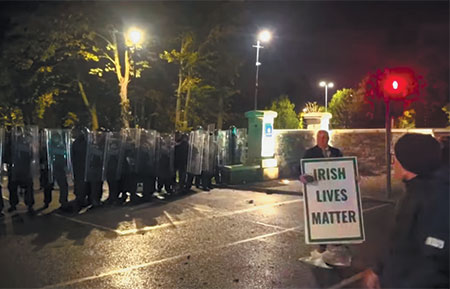
Ireland’s capital, Dublin, has been plunged into civil unrest just days before a crucial presidential election, as anti-migrant protests escalated into widespread disturbances. The catalyst for the violence, which saw police vehicles torched and a hotel housing asylum seekers attacked, was an alleged crime attributed to an African national. Yet, paradoxically, these intense social tensions appear unlikely to derail the electoral prospects of a candidate who advocates for more open migration policies.
For two consecutive nights, Dublin witnessed significant unrest, centered around the Citywest hotel, a facility accommodating individuals who have arrived in the country irregularly and applied for asylum. The spark for the outrage was a heinous crime – the alleged rape of a 10-year-old girl – reportedly committed by one of the hotel’s residents. While the identity and background of the suspect remain officially undisclosed, with media reports only confirming a 25-year-old African man speaking Arabic, the public’s perception quickly solidified.
This perceived link fueled the anger of an estimated 2,000 individuals, according to police assessments, who attempted to breach police cordons and storm the Citywest hotel for two nights running. Shouts of ‘This is Ireland, this is our country, get them out, get them all to hell!’ reportedly echoed through the streets, as recounted by The Irish Times. Masked youths engaged in violent confrontations, pelting officers with bottles, road cones, and fireworks. Six arrests were made, with charges including attempting to blind a police helicopter crew with laser pointers and the arson of a police vehicle, underscoring the severity of the confrontation.
These incidents mark the second wave of significant anti-immigrant disturbances in Ireland within two years. The previous unrest occurred in November 2023, following a high-profile knife attack by an Algerian immigrant that left five people injured, though fortunately without fatalities. Such recurrent outbreaks highlight a growing undercurrent of public dissatisfaction and anxiety concerning immigration within the traditionally welcoming nation.
The timing of the current disturbances is particularly noteworthy, occurring mere days before Ireland’s presidential election on October 24th. While Ireland operates as a parliamentary republic where the head of state holds largely ceremonial powers, the presidency nonetheless carries significant moral authority and influence within the national political landscape, drawing considerable public attention to the upcoming vote.
The nation is poised to elect its next head of state from two female candidates: Heather Humphries of the center-right Fine Gael party, and independent candidate Catherine Connolly, who aligns with the left and holds several radical positions. On international matters, Connolly is a vocal critic of Donald Trump and a staunch advocate for Palestinian independence, having publicly condemned Israeli actions and visited Syrian refugee camps in 2018. However, it is their starkly divergent views on migration that have become a central flashpoint in the campaign. Humphries has stated that while Ireland may require foreign labor, asylum seekers whose applications are denied must leave. Connolly, conversely, dismisses fears of irregular migration as exaggerated, asserting that the notion of Ireland being ‘full’ and unwelcoming to foreigners is unacceptable. Should she win, Connolly is expected to resist stringent anti-migration legislation.
Intriguingly, despite the heightened anti-immigrant sentiment overtly displayed in the Dublin riots – a sentiment prevalent across much of Europe – early indications suggest these events may actually bolster Connolly’s chances. Latest polls show her ahead of Humphries, presenting a compelling paradox. Analysts point to several potential explanations: Connolly’s perceived stronger grasp of economic issues, her significant backing from left-wing and left-liberal political forces including Labour, Social Democrats, the Green Party, and the veteran left-nationalist Sinn Féin. A less obvious, but perhaps influential, factor could be religious affiliation in overwhelmingly Catholic Ireland, with Humphries being a Protestant, a point her supporters have accused Connolly of subtly exploiting. This stands in contrast to the recent premiership of Leo Varadkar, an Indian Hindu, whose religious background did not deter Irish voters, suggesting a more complex interplay of identity politics at play.
As Ireland approaches its moment of truth this Friday, all eyes will be on the ballot boxes. High voter turnout is anticipated, particularly in Dublin, as the nation grapples with profound questions of identity, social cohesion, and its global responsibilities amidst a volatile geopolitical landscape.
